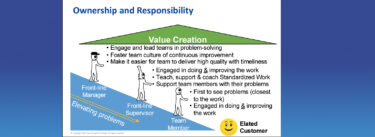If your organization has a battalion of heroes valiantly solving urgent problems that pop up as constant crises, well, good on you for having such a corps of competent hands. And yet you might ask yourself: why do we have so many crises to tackle in the first place?
Jim Womack tees up this fundamental lean question in Fewer Heroes, More Farmers, challenging the very need for heroes. Rather, he urges organizations to produce more “farmers” to tend processes and people so that crises are identified and resolved long before they reach a hazardous state. “Heroes shouldn’t be necessary once an organization is transformed,” he says, calling instead for value-stream-managers (farmers) who ask three basic questions: Is the business purpose of the process correctly defined? Is action being steadily taken to create value, flow, and pull in every step of the process while taking out waste? And, are all of your people touching the process actively engaged in making it better?
“This is the gemba mentality of the farmer who year after year plows a straight furrow, mends the fence, and obsesses about the weather, even as the heroic pioneer or hunter who originally cleared the land moves on,” he says.
This approach highlights the true power of lean as a mindset focused on process—on being continually aware of how one is producing what ultimately gets tallied as outcomes and results. The most dramatic results are produced patiently over time, and rely heavily on the steady, continuous mindfulness of earnest lean improvers.
This “problems-first” approach is owned by everyone in a true lean organization, argues Art Byrne in Kaizen Learning vs. Traditional Problem-Solving. Most companies delegate important problems to specialists on teams who “take months to create a plan and even longer to get lasting improvements,” he says, contrasting this with lean’s “learn-by-doing method that involves the people doing the work in improving the work right now.”
Allowing problems to become major projects that large teams tackle over time misses the spirit of lean, Byrne argues. Lean is a “doing” activity as opposed to a “planning” activity, an experimental mindset where all workers have permission—indeed ownership—to constantly seek better ways of working in the moment.
Indeed, “problems first” is the cornerstone of a lean culture, according to Problems First and Positive Thinking by Michael Balle. Lean is about achieving objectives through developing people, pure and simple: “The lean method to develop people is to 1) help them develop autonomy in problem solving and 2) help them develop their own clear vision of where to take their areas of responsibility. Focusing on problems and hearing adverse information without blaming the messenger are the foundational attitudes of lean thinking: no ifs, no buts.”
Balle notes that cultivating a team of committed problem-solvers takes more than a general commitment to lean. Having people ultimately see “problems first” as a positive aspect of work—an opportunity for growth—comes down to leadership. Without leaders who recognize and validate efforts to frame problems in a productive way, workers will default to an instrumental rush for quick solutions.
Shifting from solving big dramatic problems to focusing patiently on continuous improvement is a fundamental and counter-intuitive aspect of lean, according to Tracey Richardson. In Create a Real A3, Do More Than Fill in Boxes she emphasizes the need for problem-solvers to always think about purpose. “Your purpose is why you’re solving this problem,” she says, reminding people that tackling challenges always aligns you and others to broader organizational goals. Unlike one-off crises that need immediate resolution and rarely move teams closer to broader goals, a more productive approach to problems narrows them to measurable gaps that engage a range of players in framing them for success.
Tracey elaborates on the value of this calm and measured approach with Find One Second of Waste, a meditation on focused problem-solving as a means of boosting work awareness:
“Understanding that NO waste was too small to combat changed my awareness and daily work forever. I became hyper-aware of my steps, my reaches, my ergonomic position, and rework. I joined my colleagues in looking for waste everywhere: through the andon, our suggestion system, our quality circle program, task force groups for each key performance indicator or just by identifying the abnormality as we recognized it. It was an expectation of our job, not a choice that is what they were wanting us to understand: it was an essential part of our job to maintain stability, sustainability, and long-term growth and success.”
And yet, having claimed that true Lean work focuses on small problems long before they become crises, it’s worth noting that several thinkers have noted the value of lean when confronting large issues. John Shook’s It’s Not the Crisis; It’s How You Respond to It explains how Toyota’s culture of “problem-solving junkies” has helped throughout its history, and imagines how it has served the company during the accusations of sudden acceleration a decade ago.
While the entire piece is highly recommended, here’s a passage from the conclusion worth keeping in mind.
“Crisis gives occasion to greatness. Without the crisis of 1950 and Toyota’s determination to be the best in spite of its disadvantages, Taichi Ohno would have been just another good production manager, remembered fondly by those who worked for and with him, not revered throughout the global manufacturing world. All accounts are that there was nothing to indicate that Abraham Lincoln would be a great leader—it took a national crisis to bring out the greatness.”
***********************************
For more on Leading Through Crisis, consider the VLX session of this very name taking place October 19-23.





